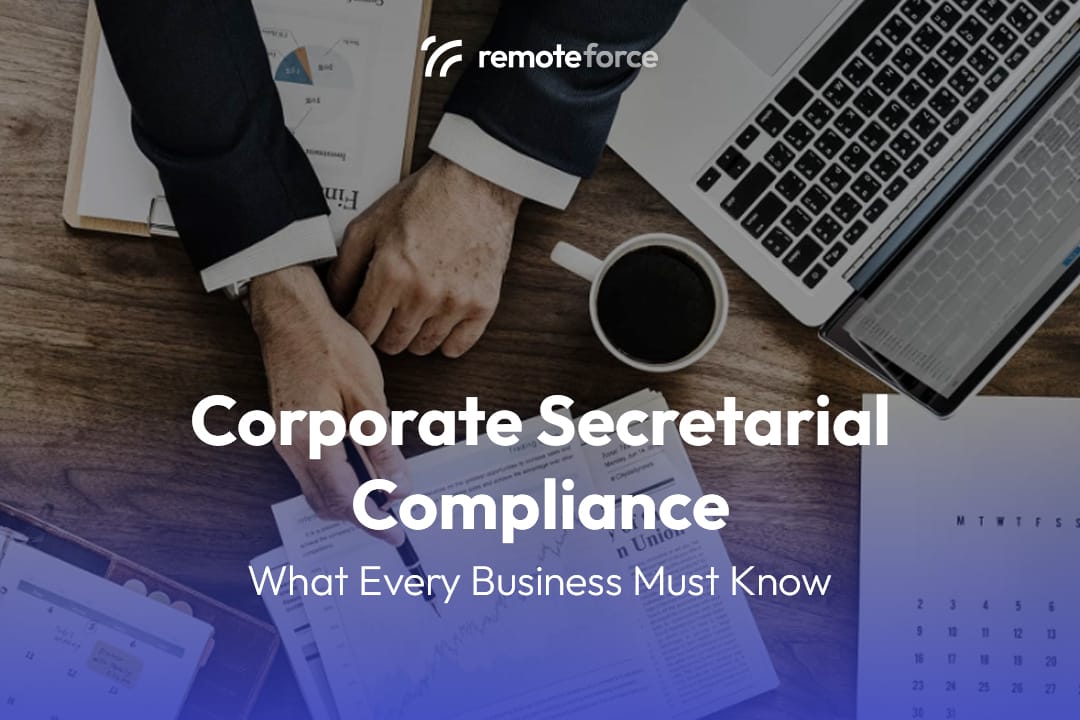In the intricate world of business operations, maintaining robust corporate secretarial compliance is not merely an administrative task; it is a fundamental pillar supporting an organization’s legal standing, operational integrity, and long-term success. For many businesses, particularly those growing or navigating complex regulatory environments, understanding the full scope of these obligations can be challenging. However, neglecting this critical area can lead to significant risks, including financial penalties, legal disputes, and reputational damage.
We understand that the demands of running a business are numerous. This comprehensive guide aims to demystify corporate secretarial compliance, outlining what you need to know to ensure your company not only meets its statutory duties but also fosters a culture of good corporate governance. From maintaining accurate records to adhering to filing deadlines and managing shareholder communications, effective compliance is paramount.
Table of Contents
ToggleWhat is Corporate Secretarial Compliance?
At its core, corporate secretarial compliance refers to the adherence to the body of laws, rules, regulations, and internal procedures that govern the administration of a company. It encompasses a wide range of activities designed to ensure that a company operates lawfully, transparently, and in accordance with its constitutional documents and the prevailing legal framework of its jurisdiction.
Traditionally, the Company Secretary plays a pivotal role in overseeing these functions. This individual, or in many modern contexts, a dedicated internal team or an outsourced professional service, acts as the guardian of the company’s compliance status. Their responsibilities extend to ensuring the board of directors is aware of their legal and fiduciary duties, and that the company’s administrative affairs are managed efficiently and effectively. The primary objectives of corporate secretarial compliance include fostering good corporate governance, maintaining transparency with stakeholders, and ensuring unwavering adherence to all statutory and regulatory obligations.
Key Areas of Corporate Secretarial Compliance

Corporate secretarial compliance is multifaceted, touching upon several critical aspects of a company’s administrative and legal framework. Understanding these core areas is the first step towards ensuring your business remains on solid footing.
1. Meticulous Statutory Record Keeping and Maintenance
One of the most fundamental duties is the accurate and timely maintenance of statutory registers. These are official records that a company is legally required to keep. Common statutory registers include:
- Register of Members (Shareholders): Details of current shareholders, the number and class of shares held, and dates of acquisition or disposal.
- Register of Directors and Secretaries: Particulars of each director and the company secretary, including appointment dates, residential addresses, and other prescribed information.
- Register of Charges: Information about any mortgages or charges created by the company over its assets.
- Minutes of Board Meetings and General Meetings: Official records of decisions made by directors and shareholders.
These records must be kept up-to-date and are often subject to inspection by shareholders or regulatory authorities. Inaccuracies or omissions can lead to serious compliance breaches.
2. Timely Filings and Disclosures with Regulatory Bodies
Companies are obligated to file various documents and notifications with governmental and regulatory bodies, such as the Companies Registry or corporate affairs commission in their jurisdiction. These filings include:
- Annual Returns/Reports: A snapshot of the company’s general information, including details of its directors, shareholders, registered office, and share capital, as of a specific date.
- Financial Statements: Annual accounts providing a true and fair view of the company’s financial performance and position.
- Notifications of Changes: Promptly reporting changes in the company’s structure or key personnel, such as the appointment or resignation of directors, changes in shareholder details, or a change of registered office address.
- Event-Driven Filings: Disclosures required upon the occurrence of specific corporate events, like the creation of new shares, amendments to the company’s constitution (e.g., Memorandum and Articles of Association or Bylaws), or significant transactions.
Adherence to statutory deadlines for these filings is crucial, as late submissions invariably attract financial penalties and can impact the company’s good standing.
3. Diligent Meeting Management
Properly conducting and documenting board meetings and shareholder (general) meetings is a cornerstone of corporate governance and compliance. This involves:
- Proper Convening: Ensuring that meetings are called with the correct notice period, accompanied by a clear agenda, and that a quorum (minimum number of attendees required) is present as stipulated in the company’s constitutional documents and applicable law.
- Accurate Minute-Taking: Recording detailed and accurate minutes of the proceedings, decisions made, and resolutions passed during these meetings. These minutes serve as official evidence of corporate actions.
- Compliance with Constitutional Documents: All meeting procedures must align with the company’s Articles of Association (or equivalent governing document) and relevant company law.
Effective meeting management ensures that decisions are made transparently and are properly authorized and recorded.
4. Upholding a Strong Corporate Governance Framework
Corporate secretarial compliance is intrinsically linked to good corporate governance – the system of rules, practices, and processes by which a company is directed and controlled. This includes:
- Adherence to Applicable Corporate Governance Codes: Many jurisdictions have codes of corporate governance that, while sometimes voluntary, are considered best practice.
- Ensuring Ethical Conduct and Accountability: Promoting a culture of integrity and ethical behavior throughout the organization.
- Managing Conflicts of Interest: Implementing procedures to identify and manage potential conflicts of interest involving directors and key personnel.
- Protecting Shareholder Rights: Ensuring that shareholders are treated fairly and that their rights (e.g., to vote, receive dividends, inspect records) are upheld.
A robust governance framework enhances stakeholder confidence and contributes to the company’s long-term sustainability.
5. Adherence to Company Law and Other Relevant Legislation
The corporate secretarial function must ensure that all company activities and corporate actions are compliant with the prevailing Companies Act (or equivalent legislation in the jurisdiction) and any other relevant laws, such as securities regulations, employment laws, and data protection laws. This requires staying abreast of legislative changes and understanding their implications for the company.
6. Efficient Management of Shareholder Matters
Maintaining positive and transparent relationships with shareholders is vital. Corporate secretarial duties in this regard include:
- Effective Communication: Providing shareholders with timely and accurate information about the company’s performance and significant developments.
- Dividend Distribution: Managing the process of declaring and distributing dividends in accordance with legal and procedural requirements.
- Share Transactions: Overseeing the processes for share transfers, allotments of new shares, and share buy-backs, ensuring they are executed correctly.
Why Corporate Secretarial Compliance is Crucial
Proactive management of corporate secretarial compliance offers numerous benefits and helps mitigate significant risks for any business.
- Avoiding Costly Legal Penalties and Sanctions: Non-compliance can result in substantial fines, late filing penalties, and in severe cases, director disqualification or even criminal charges.
- Maintaining a Positive Corporate Reputation and Investor Confidence: A strong compliance record enhances a company’s image and is crucial for attracting investment, securing loans, and building trust with business partners and customers.
- Ensuring Smooth and Uninterrupted Business Operations: Compliance failures can lead to administrative hurdles, legal challenges, and operational disruptions that divert management attention and resources.
- Facilitating Sustainable Growth and Expansion: A solid compliance foundation is essential when a business seeks to scale, enter new markets, or undergo corporate restructuring like mergers or acquisitions.
- Protecting Directors from Personal Liability: Demonstrating that the company takes its compliance obligations seriously can help protect directors from personal liability for corporate failings.
- Enhancing Transparency and Accountability: Good compliance practices foster transparency in operations and accountability to shareholders and other stakeholders.
Common Challenges in Compliance
Achieving and maintaining full corporate secretarial compliance is not without its challenges, especially for small and medium-sized enterprises or companies operating internationally.
- Complexity and Evolution of Regulations: Company law and other related regulations are often complex and subject to frequent amendments, making it difficult to keep track.
- Lack of Awareness or Understanding: Business owners and directors may not always be fully aware of the extent of their compliance obligations.
- Resource Constraints: Dedicating sufficient time, trained personnel, and financial resources to compliance can be a challenge, particularly for smaller businesses.
- Inefficient Internal Processes and Record-Keeping: Outdated or poorly managed internal systems can lead to errors, omissions, and missed deadlines.
- Cross-Jurisdictional Complexity: For businesses operating in multiple countries, navigating the diverse and sometimes conflicting compliance requirements of each jurisdiction can be particularly demanding.
Best Practices for Effective Compliance
Businesses can adopt several best practices to strengthen their corporate secretarial compliance framework and mitigate associated risks.
- Appoint Competent Oversight: Ensure a qualified Company Secretary is appointed or engage professional corporate secretarial service providers with the requisite expertise.
- Establish Robust Internal Systems: Implement clear internal controls, policies, and procedures for all compliance-related tasks.
- Utilize Compliance Calendars: Maintain a detailed calendar of all key filing deadlines, meeting schedules, and other compliance obligations.
- Promote Continuous Learning: Provide regular training for directors and relevant staff on their duties and changes in corporate law and governance standards.
- Conduct Periodic Reviews: Undertake regular internal compliance audits or “health checks” to identify and address any potential weaknesses or gaps.
- Leverage Technology: Utilize compliance management software or other technological tools to automate reminders, track filings, and maintain records efficiently.
- Seek Expert Guidance: When in doubt about specific compliance requirements or complex corporate actions, do not hesitate to seek advice from legal or corporate secretarial professionals.
The Role of Professional Corporate Secretarial Service Providers
For many companies, particularly SMEs or those with complex structures, outsourcing corporate secretarial functions to a specialized service provider can be a highly effective solution. These providers offer expert knowledge, dedicated resources, and experience in managing the full spectrum of corporate secretarial duties.
Services typically offered include maintaining statutory registers, preparing and filing statutory returns, managing board and shareholder meetings (including minute-taking), providing advice on corporate governance best practices, and ensuring compliance with legislative changes. The benefits of outsourcing include cost-effectiveness (compared to hiring a full-time specialist), access to specialized expertise, reduced administrative burden on internal staff, and greater assurance of compliance.
Partner with Experts in Corporate Secretarial Compliance
Corporate secretarial compliance is far more than a procedural formality; it is the bedrock upon which a legally sound, reputable, and sustainable business is built. Proactively managing these obligations is essential to navigate the regulatory landscape effectively, mitigate risks, and foster an environment of trust and accountability. In an era of increasing regulatory scrutiny, a diligent approach to compliance is indispensable.
If the complexities of corporate secretarial compliance seem daunting, or if you are looking to ensure your business meets the highest standards without diverting your core team from strategic objectives, expert assistance is invaluable. At RemoteForce, we specialize in providing comprehensive corporate secretarial services tailored to meet the unique needs of your business. Our experienced professionals can help you navigate the intricacies of statutory requirements, maintain impeccable records, manage corporate governance, and ensure all your filings are timely and accurate. Don’t let compliance become a burden. Partner with RemoteForce today to streamline your corporate secretarial functions and gain the peace of mind that comes from knowing this critical aspect of your business is in expert hands.




